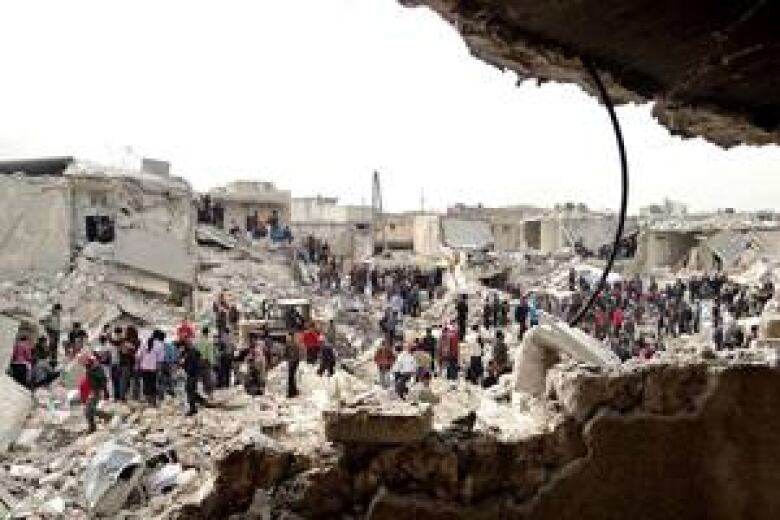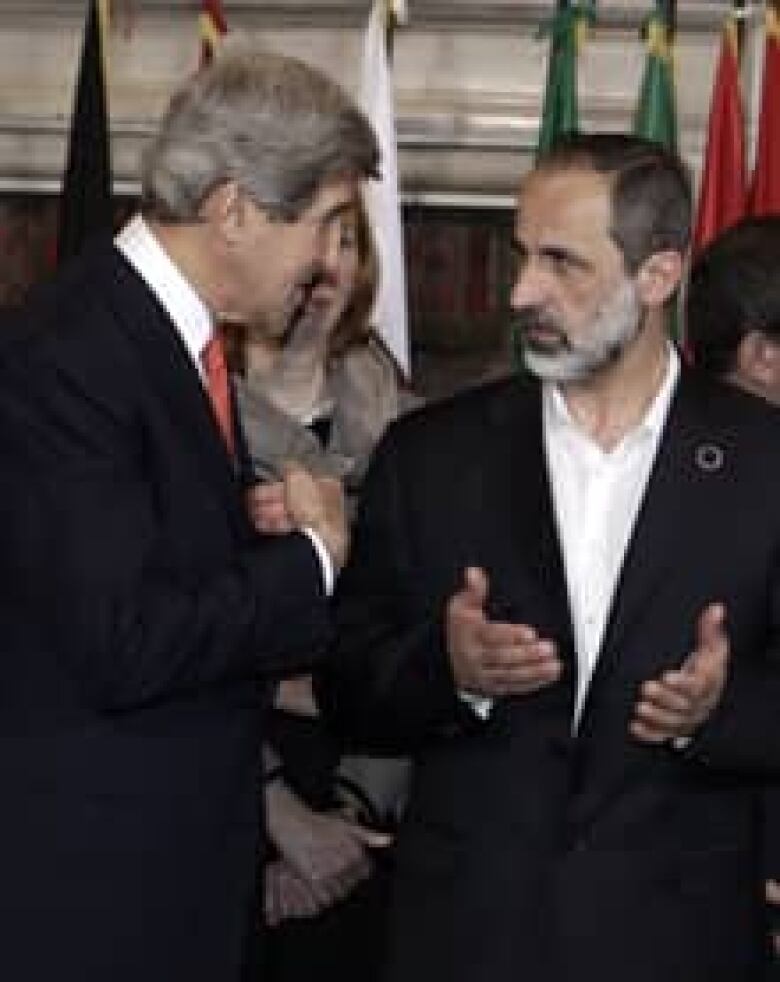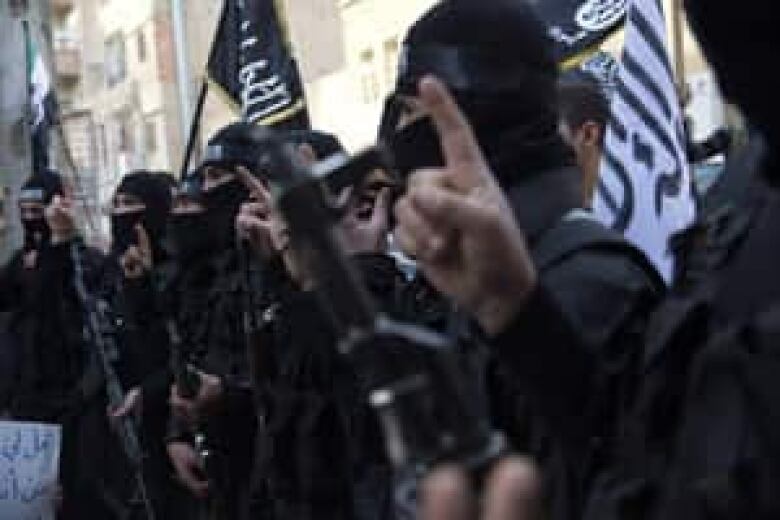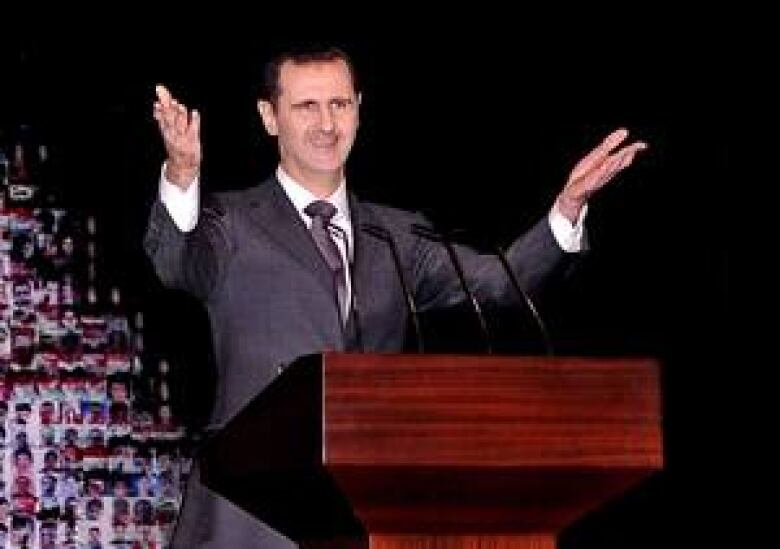No endgame in sight for Syria's civil war
The civil war in Syria seems to be in something of a stalemate, with international peace efforts going nowhere fast.
Two years ago this month protesters took to the streets across Syria, and the autocratic regime of Bashar al-Assad chose to take them on.
For this, the country has already paid an exorbitant price, with an estimated 70,000 dead, a million refugees, plus another two million people in Syria displaced from their homes, not to mention the destruction wrought by both sides.
Two weeks ago the Assad forces were accused of firing ballistic missiles into residential areas of Syria's commercial capital, Aleppo, and a nearby town. It marked a "new low" in the war, Human Rights Watch stated, as it estimated the death toll from the missile strikes at 141.

That week began with the European Union, which supports the rebels, deciding not to ease their arms moratorium on Syria.
Last week at least started with talk of negotiations by Assad's foreign minister, Walid al-Moualem, while on friendly ground in Moscow. But that was quickly rejected by the rebels as an attempt to further drive a wedge into their already divided ranks.
The opposition forces had been in disarray for some time, but particularly following an offer in January by Syrian National Coalition leader Mouaz al-Khatib to hold talks with the regime without the pre-condition that Assad step down.
On Tuesday, U.S. Secretary of State John Kerry discussed Syria with Russia's foreign minister, Sergei Lavrov, but the results were disappointing, according to UN peace envoy, Lakhdar Brahimi.Then on Thursday there was a Friends of Syria meeting in Rome between Khatib's coalition, Kerry, and foreign ministers from some of the European and Arab countries supporting the opposition to the regime.
"The ministers pledged more political and material support to the coalition," the final statement read, while repeating the support for "a negotiated solution."
Kerry's schedule has him in the Middle East until Wednesday.
Very limited peace prospects

Last week's events provided a glimmer of hope but at this point it's still difficult to see signs of an endgame in Syria, according to Paul Rogers, professor of peace studies at the University of Bradford in Britain.
"There's been some cautious indications that the regime may be willing to negotiate with some elements of the rebels," Rogers said. "There has been some recognition on the rebel side that they could not, for example, boycott the Rome meeting [as they had threatened to do], and there's maybe some very small indication coming from Moscow that the Russians can see a need to bring some kind of resolution.
"But I wouldn't rate it highly," he added.
What makes any kind of international resolution to the Syrian conflict especially difficult, in Rogers' view, is what he calls the double proxies. First there's the U.S. versus Russia, then there's Saudi Arabia versus Iran, as well as, of course, the rebels versus the regime.
Unless there's "a real coming together of the Americans and the Russians, in a sense to put pressure in turn on the Saudis and the Iranians, who would then put pressure on the Assad regime and the rebels, I see relatively little prospect" of an endgame, Rogers says.
Arm the rebels?
In U.S. political circles, and inside the Obama administration, there's been debate about arming the Syrian opposition.

Obama's previous secretary of defence Leon Panetta testified that the Pentagon, State Department and Central Intelligence Agency had argued for arming select rebel units, but that they were unable to persuade the president. Influential Arizona Senator John McCain also favours arming the rebels.
The argument in favour is that supplying weapons allows the U.S. to get an inside track with those who might eventually govern Syria when Assad finally falls, as well as to help hasten that downfall.
"There is no substitute for military aid that neutralizes the Assad regime's deadly firepower," writes influential Middle East analyst Fouad Ajami, who advised the George W. Bush administration.
"We must be done with the alibi that we can't arm and see this rebellion to victory because the jihadists now have the upper hand in the ranks of the rebels," the Johns Hopkins University professor writes in a Wall Street Journal op-ed.
But the Los Angeles Times argues the opposite in an editorial, saying "there is no guarantee that arming the Free Syrian Army would significantly hasten Assad's overthrow, and there remains the possibility that weapons provided to trusted groups would find their way to the radical Islamist fighters."
In Rome,Kerry announcedthe U.S. will provide "an additional $60 million immediately in non-lethal assistance to support the coalition in its operational needs day-to-day," but not weapons, although for the first time that aid will go directly to the rebel coalition.
Islamists have big role

Paul Rogers views the Islamists as very competent fighters, dedicated and determined to have a role in post-Assad Syria. Their numbers are growing rapidly and sometimes Islamists now lead non-Islamist paramilitaries "because they're so good at it."
One militant group said to be the most effective on the battlefield isal-Nusra, which the U.S. considers a terrorist organization.
Rogers says the Islamists "would not easily and readily go in with negotiations on the rebel side because they see this in terms of a much wider concept, as part of jihad."
Hesays there are no good options for the Obama administration and they're "simply not sure which is the best way forward.
"They're also worried if this war comes to an end relatively quickly, and the regime literally falls, then there will be quite a strong Islamist element in the post-Assad Syria."
Military victory scary
A military victory for either side looks scary to Rogers. History suggests how ruthless a victorious Assad regime would be. But Rogers anticipates that the aftermath ofa rebel military victory would also be very bloody.

The civil war has divided Syrians along sectarian lines with the Sunni majority mostly backing the rebels and the Shia, especially the Alawites, and the Christian minority mostly backing the government.
The Kurds in northern Syria, 10 per cent of the country's population, are mostly on the rebel side but are expected to push for some form of autonomy if there's a rebel victory.
On the ground the fighting seems to be stuck in stalemate with neither side making significant gains and little prospect that will change any time soon, say Rogers and other analysts.
The coalition stance that the members of their executive council must unanimously agree on any future negotiation offer, and that Assad and the members of his military and security apparatus "responsible for the decisions that have destroyed the country" not be part of any negotiated solution, along with Assad's insistence that he be able to pick and choosethe rebel factions that will sit across from his side at any peace talks, suggest that stalemate will also continue.
"We can engage in dialogue with the opposition but we cannot engage in dialogue with the terrorists,"Assad told the U.K.'s Sunday Times, in his first interview with any western media for more than a year.
As for the rebel demand that he be excluded, Assad responded that the rebels "say that dialogue will bring the downfall of the president and I am inviting them to dialogue. Why don't they then come to the dialogue to bring about the downfall?"













_(720p).jpg)


 OFFICIAL HD MUSIC VIDEO.jpg)
.jpg)



























































































